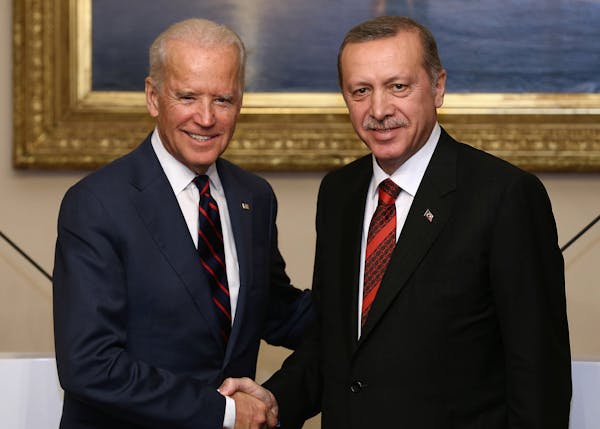Much about Turkey today vexes U.S. policymakers and observers of the region. Distaste is high with what is widely seen as rising authoritarianism centered on President Recep Tayyip Erdogan. So is bewilderment over seemingly obstinate and unhelpful grandstanding on regional issues, not to mention anti-Americanism. Some even question whether Turkey is a real ally anymore.
Nowhere does bilateral discord look sharper than over the Islamic State in Iraq and Syria, a radical terrorist group beheading its way across the Middle East. On Sept. 10, President Obama called for a wide-ranging international coalition to combat the group (also known as the Islamic State in the Levant, or ISIL). NATO members and key Middle East players are contributing forces to the effort. Despite risks to its security that ISIL poses, Turkey is not.
Some think its stance is worse. Perhaps it buys ISIL-produced oil, indirectly funding terrorism, or colludes in the flow of foreign fighters that have joined ISIL's ranks. The passive stance of Turkish forces atop ridgelines overlooking the border town of Kobane where ISIL is fighting Syrian Kurds is the poster child of a major U.S. ally seeming to sit on the sidelines.
Mirror-image frustrations abound on the Turkish side. Officials were dismayed that Obama's August 2011 call for "President Assad to step aside" lacked a strategy to bring about that end. They regard U.S. support for the moderate opposition as parsimonious, inconsistent and ineffective. They felt double-crossed when the president canceled planned strikes against Assad in August 2013 after he crossed the no-use-of-chemical-weapons "red line." They have been disappointed by the world's inadequate response to the humanitarian crisis in Syria and the staggering refugee burden that they and all of that country's neighbors now bear.
Leaders in Turkey's capital, Ankara, liked what they heard in Obama's ISIL strategy speech: U.S. leadership, commitment to military action against ISIL, and recognition that new approaches would be needed in Iraq and Syria to address the brutal and sectarian policies that made those countries' Sunni populations fertile recruiting ground for ISIL.
However, in the implementation of that strategy, Ankara sees plenty of action involving ISIL and Iraq, which it appreciates, but little on Syria, which for Turkey is the major national security concern.
As distrustful of U.S. resolve in the region as Americans are of it, and not wanting to see ISIL is disrupted while Assad and what he means for his country endure, Turkey has conditioned its role in the ISIL coalition on agreement about Syria. It has long proposed working together on a no-fly or safe zone within that country — territory along the border with Turkey where displaced Syrians would feel safe, to which U.S.- and Turkish-trained fighters of the Free Syrian Army (FSA) could be deployed, and from which a more credible alternative to both Assad and ISIL, backed by force, could develop.
Given Americans' antipathy for another war, the Obama administration has been rightly cautious on Syria, and it may also be right to prioritize for now beating back ISIL in Iraq, where the levers for fixing matters seem more extensive. But the disintegration of Syria, the leaching out of instability in the region and the humanitarian catastrophe that will grow worse require a more directed approach.
Ankara may be right that no effort to combat ISIL and what it represents will succeed absent some resolution of Syria's problems. But insistence on a priori agreement about Syria and a no-fly zone there leaves the ISIL problem inadequately addressed, dials Turkey out of the action in a place where its comparative advantages are great and adds to the public's reluctance to get involved at all.
Finding a way to reconcile competing U.S. and Turkish narratives and work together will be essential for improving the situation in Syria for ensuring security on the southern frontier of an ally to whose defense we are committed and for the broader health of an alliance that has served U.S. interests well for over six decades. Doing so will not be a reward for a government whose behavior may be less than saintly, but an exercise to protect American interests in the most dangerous part of the world.
Ross Wilson, who recently became a Minnesota International Center board director, served as U.S. ambassador to Turkey and Azerbaijan during a 30-year career in the U.S. Foreign Service.

The little park that could … be better
Climate change looms large this election year
For this Minnesota legislator, action targeting child abuse is intensely personal


